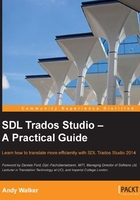
What this book covers
Chapter 1, Getting Started with SDL Trados Studio, shows how to install and run SDL Trados Studio 2014 for the first time, navigate your way around the SDL Trados Studio 2014 interface, and customize it to your own way of working.
Chapter 2, Creating and Using Translation Memories, explains how to create a translation memory and select translation memories to use when you open a document for translation.
Chapter 3, Translating a File, shows how to translate a file in SDL Trados Studio, from opening a document to generating the translated version, including lots of practical tips and tricks for getting the best out of SDL Trados Studio while you translate. This chapter has a downloadable sample file to work along with.
Chapter 4, Formatting and Tags, explains how to work with visual formatting and tags to ensure that the formatting and functionality of your translated document is the same as that of the original. This chapter has a downloadable sample file to work along with.
Chapter 5, Word Counts and Billing Information, demonstrates how to produce a report showing the word count broken down into various types of match and use this information for quoting and billing. This chapter has a downloadable sample file to work along with.
Chapter 6, Editing and Quality Assurance, shows how to make the best of SDL Trados Studio during the review process using features designed specifically to help you edit and check your work, such as Review mode, the Display Filter, Track Changes, Comments, and the QA Checker. This chapter has a downloadable sample file to work along with.
Chapter 7, Working with Projects, explains how to use a project both to preserve and re-use your translation settings and to translate a set of files as a part of the same job. This chapter also shows how to use project packages to share the material in a project with another person.
Chapter 8, Managing Terminology, shows how to create a termbase for storing terminology and other chunks of text, which can then be used to recognize and display term matches automatically during translation.
Appendix A, Working with Files from Earlier Versions of Trados, indicates how to upgrade SDL Trados 2007 translation memories and use bilingual Translator's Workbench and TagEditor files in SDL Trados Studio.
Appendix B, Managing Translation Memories, explains how to import and export translation memory data in SDL Trados Studio translation memories and selectively modify or delete their content. This chapter also explains how to use the alignment feature to recycle content from existing pairs of documents (source and translation) that were translated without using a translation memory tool by aligning them for use in an SDL Trados Studio translation memory.